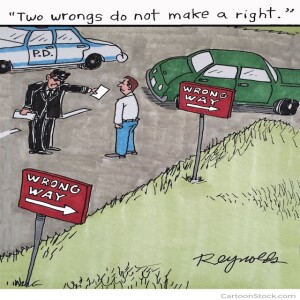
Sunday Dec 01, 2024
DO THE WRONG THING TO DO THE RIGHT THING… (part 1 of 2)
This week, I want to talk to you about how sometimes you must do the wrong thing to do the right thing. This is a very difficult concept to wrestle with personally, as it’s a paradoxical idea and not intuitive so, as I have a lot to share here, I’m going to split it into two parts this week and next week.
We grow up tending to believe in strict rules of right and wrong, always seeing life through a black-and-white lens. However, sometimes, we encounter complex situations and realise that there are actually many grey areas in life that we have to navigate through. It’s extremely difficult sometimes.
Doing the wrong thing doesn't always equate to acting unethically or immorally. Instead, it can mean stepping away from conventional paths to serve a higher purpose or protect a greater good. It's about being guided by your values, even when they lead you to challenge established norms.
This is a paradox and turning "wrong" actions into "right" ones raises issues like moral relativism, potential harm and long-term consequences and there can also be issues of subjective bias, ethical standards and even the rule of law to consider, if we are to avoid internal confusion.
Here are some examples:
- Sometimes, parents must allow children to make their own mistakes and learn from them, rather than always stepping in to help, as this hinders them in the long run. Whilst it feels wrong to let a child fail and face consequences, this is the right way to increase independence and resilience.
- Sometimes, ending a personal relationship may feel wrong or too hard, due to emotional bonds and shared history. However, where that relationship is an unhealthy or toxic one, leaving it could actually be the right decision for a person’s personal growth and overall well-being.
- Sometimes, a doctor decides to lie about the severity of a patient’s condition to try to reduce unnecessary stress for them in their final stages of life. This seems wrong according to medical ethics, but may feel right to the doctor in prioritising the patient’s overall well-being.
The danger here is that doing the wrong thing to do the right thing can promote moral relativism, where ethical standards become subjective and undermine the consistency of basic moral principles, leading to slippery slope arguments, where boundaries of acceptable behaviour become blurred.
So, this week, remember that, whilst the paradox of the wrong thing becoming the right thing requires careful consideration of complex moral and ethical principles, it also needs careful thinking. about potential harms. I’ll tell you more about this next week!
No comments yet. Be the first to say something!